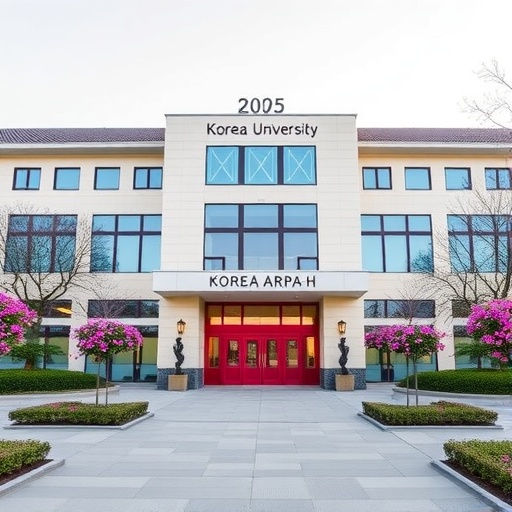The Vaccine Innovation Center at Korea University College of Medicine, under the leadership of Professor Heejin Jeong, has been designated as the lead institution for a groundbreaking health security research initiative spearheaded by South Korea’s Ministry of Health and Welfare. This initiative, known as the “2025 Korea-ARPA-H Project,” represents a national effort to push the boundaries of antiviral therapeutic development. It seeks to harness cutting-edge biomedical research and biotechnology to address one of the most pressing global challenges: controlling and mitigating the effects of future pandemics with broad-spectrum antiviral agents and combination therapies.
The focal point of the project is the development of advanced therapeutic strategies that focus not only on the viral pathogens themselves but, critically, on preventing the severe disease progression that largely contributes to pandemic mortality. This vision stems from a strategic understanding that traditional antiviral treatments, which target specific viral strains or species, often face obstacles due to viral mutation and immune evasion. Consequently, this project aims to establish a versatile and universal treatment platform that remains effective regardless of viral genetic shifts, providing significant clinical utility during outbreaks of both known and unknown infectious agents.
Set to run over a five-year period from 2025 to 2029, the initiative benefits from a substantial funding allocation of approximately 12.5 billion KRW, equivalent to around 9.5 million USD. This substantial budget supports a multidisciplinary consortium that synergizes expertise across academia, industry, and applied technology sectors. Alongside Korea University’s Vaccine Innovation Center, key collaborators include Seoul National University, Yonsei University, S2CBIO Co., Ltd., and the Korea Institute of Ceramic Engineering and Technology. Each partner brings specialized knowledge in virology, immunology, clinical research, and bioengineering, facilitating an integrative approach to antiviral development.
A hallmark of the project’s innovation is its dual focus: targeting viral replication while simultaneously modulating host immune responses that trigger severe disease states. Excessive or dysregulated immune activation often leads to complications such as cytokine storms, acute respiratory distress syndrome (ARDS), and multi-organ failure, which are significant causes of mortality in viral diseases. By designing combination therapies that combine antiviral efficacy with immune modulation, the researchers aspire to create treatments that not only suppress the virus but also mitigate collateral tissue damage and inflammatory pathology.
Moreover, the project acknowledges the looming threat of “Disease X” — an as-yet unknown pathogen with pandemic potential. Current therapeutic arsenals are predominantly strain-specific, leaving gaps in preparedness for novel infectious threats. By developing broad-spectrum antiviral agents capable of targeting conserved viral features across diverse families, the initiative anticipates enhancing global readiness. This universal platform concept aims to accelerate therapeutic response times and reduce dependency on vaccine development timelines when confronting emergent pathogens.
From a translational perspective, the anticipated outcomes extend beyond direct clinical benefits. By protecting vulnerable populations including the elderly and individuals with preexisting health conditions, the therapies developed can markedly reduce the burden on healthcare systems during pandemics. Improved therapeutic efficacy leads to decreased hospitalization rates and mortality, thereby optimizing the allocation of limited medical resources such as intensive care units, ventilators, and manpower.
The project is also poised to elevate South Korea’s stature within the global pharmaceutical and biotechnology industries. Entering the high-value-added therapeutic market with innovative antiviral agents positions the nation as a leader in infectious disease countermeasures. The integration of medical research with biotechnological innovation drives economic growth while simultaneously enhancing national health security, showcasing a model that couples scientific excellence with public health imperatives.
Principal Investigator Professor Kisoon Kim emphasized the comprehensive nature of this endeavor, stating that the core objective is to establish a precision treatment strategy that complements vaccination programs during pandemics. Unlike vaccines that primarily prevent infection, these therapeutic interventions aim to manage disease progression and clinical outcomes post-infection. This multi-pronged approach strengthens resilience against viral outbreaks by diversifying countermeasure modalities.
Director Heejin Jeong underscored the transformative potential of the project for Korea University’s Vaccine Innovation Center, highlighting its role as a nexus for vaccine and therapeutic research. Their integrated approach blends innovations in medical science with advances in biotechnology to produce treatments that are universally applicable across viral diseases. This positions the center as a globally competitive hub dedicated to pandemic response innovation.
Technically, the research program will likely employ state-of-the-art technologies such as antiviral high-throughput screening, structural biology for drug-target elucidation, and immunomodulatory profiling using advanced cellular and animal models. Insights gained from viral pathogenesis and host-pathogen interactions will guide the design of combination regimens that optimize efficacy while minimizing adverse effects. This rigorous scientific methodology ensures that therapeutic candidates are robust against viral variability and host heterogeneity.
Furthermore, the project’s long-term vision anticipates adaptive therapeutic platforms that can be rapidly customized based on emerging viral threats and patient-specific factors, embodying the principles of precision medicine. By leveraging genomic, proteomic, and immunologic data, these therapies can be fine-tuned to target critical viral processes and modulate host responses tailored to individual risk profiles. Such sophistication promises to revolutionize the landscape of antiviral treatment.
In summary, Korea University’s leadership in the 2025 Korea-ARPA-H Project represents a monumental stride toward future-proofing global health against pandemics. Through interdisciplinary collaboration, innovative drug discovery, and integration of immunological insights, the project aims to develop broadly effective antiviral medicines that reduce mortality, protect vulnerable populations, and empower public health systems worldwide. This initiative exemplifies how strategic investment in science and technology can deliver transformative impacts on infectious disease control and health security.
Subject of Research: Development of Broad-Spectrum Antiviral Agents and Combination Therapies to Prevent Severe Disease in Future Pandemics
Article Title: Korea University Leads Ambitious National Project to Develop Universal Antiviral Therapies for Future Pandemics
News Publication Date: Not provided
Web References: Not provided
Image Credits: KU Medicine
Keywords: Antiviral activity, Vaccine research, Clinical research
Tags: 2025 Korea-ARPA-H Projectadvanced therapeutic strategiesantiviral therapeutic developmentbiomedical research South Koreabroad-spectrum antiviral agentscombination therapies for viruseshealth security research initiativeinfectious disease controlKorea University College of Medicinepandemic preparedness strategiesProfessor Heejin Jeonguniversal treatment platform





